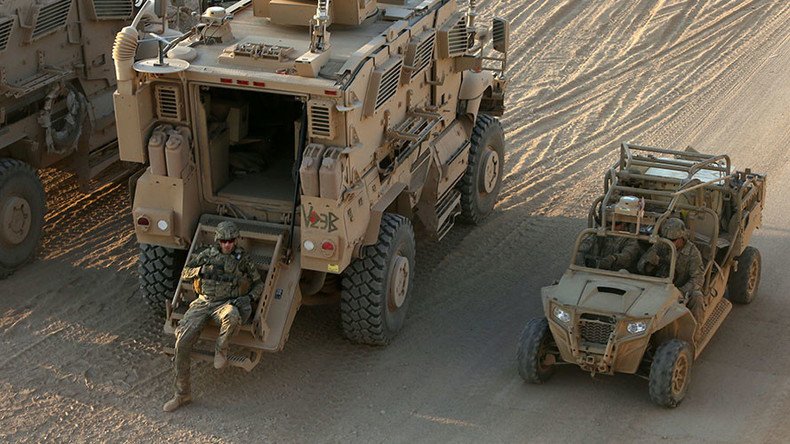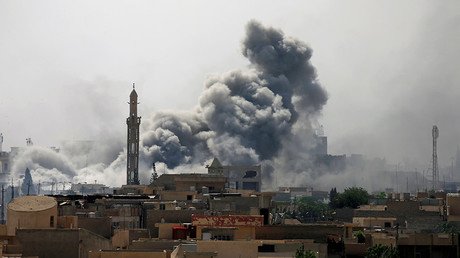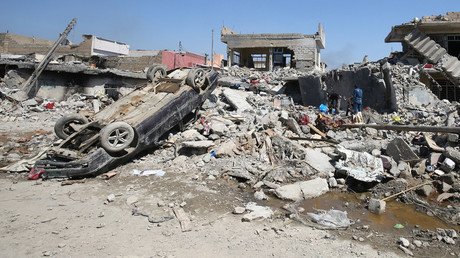US foreign policy fail: Long tradition of 'supporting totalitarian dictators in Middle East'

It is simply American policy to not take responsibility for people killed and change the definition of civilians and combatants. American officials should see children and people in the Middle East like they see their own children and people, says Jack Rice, former CIA officer and international lawyer.
The US-led coalition issued a report about civilians killed in air strikes since 2014.
The report suggests at least 484 civilians have been killed in Syria and Iraq since 2014. However, the figures provided are much lower than many expected.
RT: The report comes out monthly and we see the number of casualties go up and up. Will there be any accountability for these deaths?
Jack Rice: Likely no. I wouldn’t expect any at this point. What we are seeing right now is what we have seen in Afghanistan and elsewhere in the world. The real problem that we face is …you could say this number tips the 500 mark and numbers are probably substantially higher…but the real problem that anybody faces under these circumstances is that now you have entire extended families that now will see the West and specifically the US as the enemy. If you are trying to win hearts and win minds, this is not how you do it.
RT: The numbers estimated by activists are much higher, while the US admitted a single strike reportedly killed over 100 people. So how realistic is the figure of 484 over three years?
JR: That is the hard part because not only does the United States not necessarily take responsibility for all those who have been killed, they've also changed the definition of what makes a civilian vs. what makes a combatant. And that is one of the problems. We saw that under the Obama administration. This is a not a left or right, Republican or Democratic question. It is simply American policy… Every war zone that I’ve been in, and I’ve been in a lot of them, what happens almost always is that it’s the civilians that pay the price. It’s all well and good to say ‘it is just a fact of life.’ But it is really about death. If you want to shine it up and say that it just a cost of things, I am assuming that it is not the general’s family, I’m assuming it’s not the general’s problem. That’s really what we need to be talking about.
RT: The Defense Secretary says civilian deaths in war are a "fact of life". Should top officials be expressing such views and in such a way?
JR: What I really hope is that American officials will see those very same children and people in the Middle East like they see their own children and people. It is a critical requirement if you are going to look at these issues and treat them as you should...
Fighting terror, ISIS or Al-Qaeda is you’re fighting a philosophy. You can’t simply use bombs to kill people and that this somehow will stop this organization. It will continue to expand because there are so many different people in the world who are struggling and looking for answers and their answers sometimes can be found in their own mind in support of the terrorist organizations… The real problem is that what we need to address is the underlying causes that drive people into issues of terror. Philosophically, one of the problems the United States has had is they’ve supported totalitarian dictators throughout the Middle East. We have seen this in Egypt with Mubarak, we saw this in Saudi Arabia, Afghanistan, Pakistan and in other parts of Southeast Asia.
'Civilian casualties are a fact of life' - US Defense Secretary #Mattis on anti-ISIS 'annihilation tactics' https://t.co/SWaFzZx1YC
— RT (@RT_com) 29 мая 2017 г.
'Trump sending signals he wants to attack Iran'
RT also spoke with Gerald Horne, author and historian, for his views on the situation.
RT: The report comes out monthly and we see the number of casualties is going up. Will there be any accountability for these deaths?
Gerald Horne: Let us hope so. But what we need to realize it that this account bespeaks the fact that Donald Trump, despite his campaign rhetoric in 2015-2016, is not the isolationist he appeared to be. This should have become clear when he launched cruise missile attacks on Syria in April 2017, which by the way helped to reassure the Liberal interventionist sector of the US ruling elite that he was not an isolationist. It also bespeaks the fact that he is ramping up tensions with Iran as indicated by his trip to Saudi Arabia some days ago. That is to say to the extent that Iran is supporting the Damascus-based regime; by attacking Syria he is sending a signal that ultimately he wants to attack Iran.
RT: Numbers estimated by activists are much higher; the US admitted a single strike reportedly killed over 100. So how realistic is the figure of 484 over three years?
GH: It sounds like a scandalous understatement. I would ratchet up those figures by several orders of magnitude. We also need to understand that as a result of Mr. Trump’s trip to Saudi Arabia he is now tightening the alliance with the Saudi regime. And the Saudi regime as we well know is a fierce opponent of the Damascus-based regime of President Assad. So, I would expect those numbers to go up in irrespective of what they indicate at the moment.
RT: Going back to the strike in Mosul in March, how justified was it to shift the blame on ISIS?
GH: It is difficult to say. Keep in mind that going forward the Pentagon has already made clear that it's pursuing a policy of what is called “annihilation” against the so-called ISIS and the Pentagon has also indicated that it expects an escalation of civilian casualties as a result. This is what they said in official statements. We should take them at their word. And therefore your first question becomes ever more timely: “When there will be accountability for the civilian casualties?”
RT: The Defense Secretary says civilian deaths in war are a "fact of life". Should top officials be expressing such views?
GH: Clearly, that was a public relations disaster. That’s to say that expressing such an attitude basically bespeaks a cavalier approach to international law, which looks disdainfully at the idea of civilian casualties as some kind of collateral damage, as the Pentagon puts it. But, I’m afraid that’s the state of play as we speak.
The statements, views and opinions expressed in this column are solely those of the author and do not necessarily represent those of RT.














